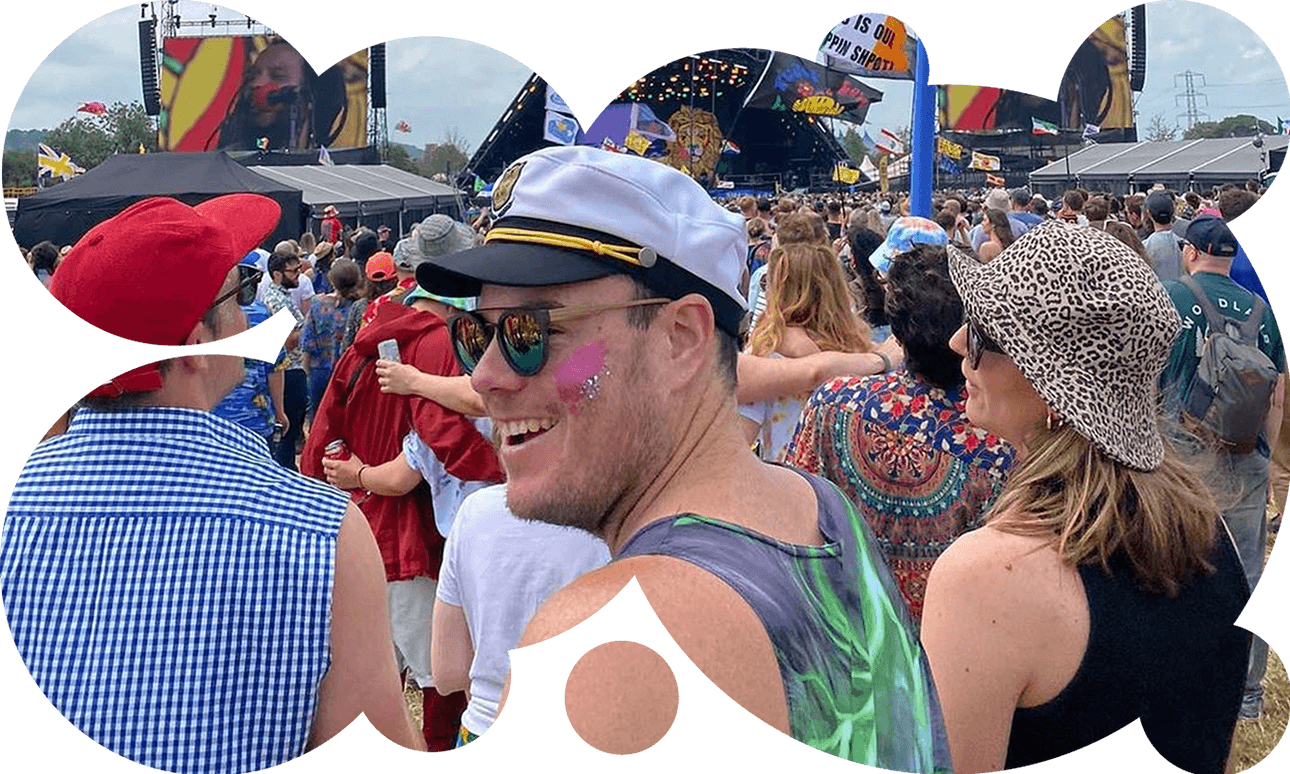The Today FM broadcaster travelled half way around the world to Glastonbury. He caught some great acts. And he caught Covid. Again.
Back in October 2019, while based in London and working as Newshub Europe correspondent, Lloyd Burr booked tickets for the following year’s Glastonbury. Then Covid-19 came along, cancelling the Worthy Farm festival and pretty much everything else. After another cancellation in 2021, it was resuscitated for 2022. Burr, by then back in Aotearoa where he is a host at Today FM, was determined to use his tickets.
“I was like: I have to do this. But then I talked to the bosses and they said, ‘Ah, we’ve just launched a radio station.’ I said: ‘This means a lot to me. It’s on my bucket list. I have to do this. And they said, ‘Off you go.’”
It was worth it. “I had a great time. It was more than I ever thought it would be.” There was just one blemish. He came down with Covid-19. Whether he picked it up in the lead-up or at the festival itself he can’t be sure. But he wasn’t alone. Unsurprisingly, given the scale and squeeze of the event, attended by more than 200,000 in Somerset fields, many tested positive in the days following, forming part of what is being called Britain’s fifth Covid wave. Burr hadn’t just caught Covid, though; he’d caught Covid for the third time.
It was in the UK that Burr, whose claims to fame include fending off a drunken football fan who doused him with a pint of beer during a breakfast TV live cross and building an exquisite replica Sky Tower out of food packaging to pass the time in hotel isolation, suffered each of his Covid bouts. The first was in the early days of the pandemic, long before vaccines had been developed. Burr was living in a basement flat in Camden Town. It was March 2020. He had caught what would have been the original, or “wild type” Covid. “There was no testing at all. They just said: Stay at home unless you’re dying; don’t call an ambulance, because there are no ambulances available. Call a mate to cart you off to hospital if you’re that sick.”
He was ill for about a fortnight, after which he developed tonsillitis. It was made worse by “the whole scariness of whatever the heck was going on around the world at the time – the unknown just added to it”.
The second time? Over a year later in July 2021. “It was the day before I was meant to fly back to New Zealand to end my time as Europe correspondent. I got my pre-departure test back. ‘You’ve got Covid!’ I had to isolate for 10 days, book an Air BnB, cart all my shit there and tell the bosses they’re paying for it all.” This time it was probably delta, he reckons – “that was the variant du jour” – though he’d had his first vaccine dose, which limited the severity. But it was still bad. “That lasted for about five days of being just a miserable prick. Sleeping all day, sleeping all night, burning eyes, headache, bed sweats and what not.”
By contrast, then, the recent third cut – by which time Burr was triple-vaxxed – was the least deep. Of the Glastonbury variant – omicron, presumably – he says: “It didn’t actually floor me … It probably lasted about two mornings of just feeling really bad. Then I came mostly right.” He was testing negative before he boarded a flight back to New Zealand. But he wouldn’t wish it on anyone. “It was still pretty gross,” he says.
While repeat experiences of Covid infection have become relatively common in many parts of the world, they remain rare in New Zealand. That looks set to change, however, with with the highly transmissible (and reinfective) BA.5 subvariant adding swell to a winter omicron wave. Last week the government slashed the period after which someone who is infected with Covid is exempt from testing if symptomatic, from 90 to 29 days.
Channelling Ashely Bloomfield, Burr’s advice is: don’t take this virus lightly. He’s back in good health; he’s not showing signs of long Covid. But that won’t be the case for everyone. “The scary thing about Covid is that it is like an unlucky dip,” he says. “You may get it and get a severe reaction and die, and become a statistic. That’s why I don’t like comparing it to other sicknesses because there are still big unknowns.”
An erroneous mention of Covid alpha in this article has been corrected to wild type.




